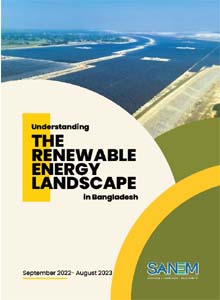Understanding the Renewable Energy Landscape in Bangladesh
 The energy landscape of Bangladesh is primarily characterised and sustained by fossil fuel-based energy sources, namely, natural gas, with more than half of the electricity being generated by domestic natural gas and imported Liquefied Natural Gas (LNG). The rest of the power generation is sourced from coal, diesel, furnace oil, and a tiny portion by hydro and solar (BPDB, 2022). The country’s power and energy sector confront substantial hurdles that highlight its inherent structural and institutional weaknesses despite its noteworthy accomplishments. The unpredictability in the global energy market, notably stemming from the Russia-Ukraine conflict, is placing a strain on the government’s finances, as evident from the financial stress experienced by the BPDB. With declining domestic gas reserves and plans for expanded LNG imports and infrastructure development, the nation’s vulnerability to shifts in global energy prices is amplified. Additionally, Bangladesh has made precise climate commitments within its Nationally Determined Contributions (NDC) under the Paris Agreement. In November 2022, the country introduced the “Mujib Climate Prosperity Plan,” which initially set ambitious renewable energy (RE) targets at 30% by 2030 and 40% in power generation by 2041. Subsequently, these targets were revised to achieve 40% power generation from clean energy sources, including hydrogen, nuclear, ammonia, and renewables. Under this scenario, the available alternatives must be duly explored and evaluated for understanding and choosing the best energy mix available for the country. We must seek a sustainable approach to adopting green and clean energy solutions in Bangladesh to secure our energy needs amidst global uncertainty while meeting climate commitments. To investigate how fuel imports, especially LNG, affect the overall health of Bangladesh’s Power Energy Sector, whether any cost-effective alternatives are available, and assess the current state of renewable energy development in Bangladesh, SANEM has crafted two research papers.
The energy landscape of Bangladesh is primarily characterised and sustained by fossil fuel-based energy sources, namely, natural gas, with more than half of the electricity being generated by domestic natural gas and imported Liquefied Natural Gas (LNG). The rest of the power generation is sourced from coal, diesel, furnace oil, and a tiny portion by hydro and solar (BPDB, 2022). The country’s power and energy sector confront substantial hurdles that highlight its inherent structural and institutional weaknesses despite its noteworthy accomplishments. The unpredictability in the global energy market, notably stemming from the Russia-Ukraine conflict, is placing a strain on the government’s finances, as evident from the financial stress experienced by the BPDB. With declining domestic gas reserves and plans for expanded LNG imports and infrastructure development, the nation’s vulnerability to shifts in global energy prices is amplified. Additionally, Bangladesh has made precise climate commitments within its Nationally Determined Contributions (NDC) under the Paris Agreement. In November 2022, the country introduced the “Mujib Climate Prosperity Plan,” which initially set ambitious renewable energy (RE) targets at 30% by 2030 and 40% in power generation by 2041. Subsequently, these targets were revised to achieve 40% power generation from clean energy sources, including hydrogen, nuclear, ammonia, and renewables. Under this scenario, the available alternatives must be duly explored and evaluated for understanding and choosing the best energy mix available for the country. We must seek a sustainable approach to adopting green and clean energy solutions in Bangladesh to secure our energy needs amidst global uncertainty while meeting climate commitments. To investigate how fuel imports, especially LNG, affect the overall health of Bangladesh’s Power Energy Sector, whether any cost-effective alternatives are available, and assess the current state of renewable energy development in Bangladesh, SANEM has crafted two research papers.
